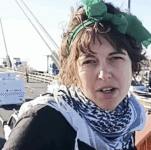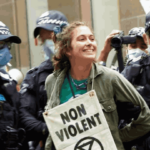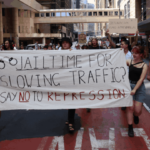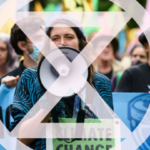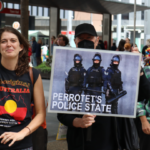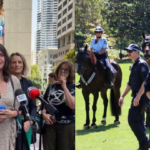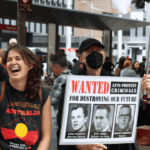“We Are Way Out of Time”: Women from XR Victoria Protesting for Two Years Warn Social Collapse Imminent
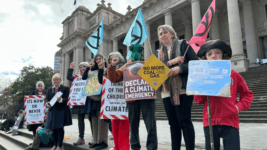
A group of women from Extinction Rebellion (XR) Victoria marked the two year anniversary of their ongoing weekly protest demonstration last Friday, 8 August 2025, as they continued to call for Australian governments to act on climate. And as usual the women met on Wurundjeri and Boon Wurrung land out the front of Parliament House in Melbourne.
Gathered before parliament, the women initially appear in good spirits. However, that’s until they’re asked about the cause that they’re protesting and then their tone drops and becomes more serious as they note they’ve been gathering on the steps of the building where politicians meet for two years now, and they’d considered that those in power would have taken action long ago.
Indeed, it’s now more than five years since activists in this country began forming their own Extinction Rebellion chapters to escalate the cause of the climate emergency to the front and centre of the newsreel, yet these XR women, as they continue to meet are sharing in each other’s despair because despite the prominence of the issue, nothing is being done at the political level.
The weekly XR Victoria demonstrations outside of Melbourne’s parliament will continue, however as one thing the women have learnt is that continuing to turn up and campaign for an end to fossil fuel does change the minds of regular constituents on the ground.
The rebellion continues
Extinction Rebellion commenced agitating for an end to the societal behaviours that are causing the climate to collapse in London in early 2019. By October that same year, XR organisers on Gadigal land in Sydney conducted a weeklong series of protest actions, that included a mass rally through the city, which involved 30 people purposefully getting arrested for the cause.
Known as the Spring Rebellion, the October 2019 XR action took place at the beginning of what was going to be a long and smoky summer along the eastern seaboard, as the bushfires that were then commencing were about to burn down 20 percent of mainland forest on this continent and would continue on until February 2020, right up until the COVID lockdowns began.
Yet, the Albanese government since coming to office in 2022 has continued on with “business as usual”, as it has greenlighted dozens of new coal and gas projects, and when a re-elected federal Labor took office this year, new environment minister Murray Watt gave approval for the North West Shelf project, which is the worst climate bomb the country has ever seen.
Sydney Criminal Lawyers paid a visit to the Extinction Rebellion Victoria demonstration on its two year anniversary, to speak to the women about the state of the climate right now, how their ongoing demonstration is making a difference on the ground, and the fact that taking protest action does forge change.
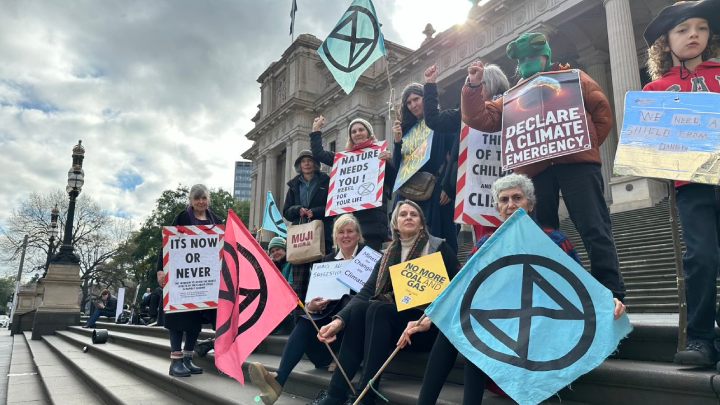
Today, Friday, 8 August 2025, marked two years since your group made up of members from Extinction Rebellion Victoria has been meeting out the front of Parliament House in Melbourne every week to raise the alarm over the climate emergency.
So, how do you feel about the crisis right now, as well as the Australian government’s response?
Bronwyn McIntyre: I’m verging on despair to be honest. I’ve been campaigning for climate full-on for the last five years, and I would have thought that by now emissions might have started reducing and temperatures might have started going down.
But no, we have a government that just wants to approve new coal and gas. So, I find it hard not to despair. But coming here and being with all the others helps.
Over the course of your prolonged two-year action, Israel has launched a full-scale genocidal attack on the Palestinians of Gaza, and it continues 22 months on. So, how has this changed things and factored into your campaign?
Claudia Stern: We started off just campaigning about climate, but after October 2023, we had a Palestinian guy, Ahab, who was sitting here every day with us for one and a half years.
Every day we included campaigning against Gaza more and more, until the extreme campaign of the Israelis against Gaza and the whole Palestinian issue has become a big part of it.
There have been attacks on the right to protest over recent years in Victoria, NSW, South Australia and Tasmania.
So, how is the situation with the right to protest at present?
Helen Bowman: It’s a really serious issue. It’s dangerous for democracy to start introducing laws that reduce people’s capacity to speak out.
We have come to this out of a sense of frustration. We have tried all other ways of expressing our concerns, including trying to speak with our local members of parliament.
We know that action works. We don’t know how it works, or when it precisely works, but we do know that action makes a difference. Having been here now for nearly two years, we have seen hardened attitudes shift.
We have seen people who were very hostile at first become friendly over time. So, we know it’s really important.
An example of this is that someone from the Climate Council came up and said to me that it was lovely to see us all here, as they were starting to lose hope.
We know that it does have an impact upon people.
What would you say has been the success of this group in particular?
Helen Bowman: This group is quite extraordinary in the way we operate. We truly are an affinity group. There is no leader as such. We all take on responsibilities if and when required.
Lesley is an incredible communicator, so she is often the one handing out the letters and talking to people. I feel my role is to bear witness.
But the actual mechanics of the group setting up is just something that one of us has to do, and one of us is always best placed to do that each time. We take on that responsibility.
The ongoing action has worked relatively seamlessly, and so it has a momentum that will continue.
This is something that we can keep doing as long as we need to, because it is a way that we can all deal with our anxiety about the issue, but it is also a way to take action that is certainly consistent with peaceful protest. The ethics of Extinction Rebellion is that it is peaceful and that it is direct.
This is a slow burn action. We need to take the message to the people in power all the time, as they are the people that can declare a climate emergency. They can take political action if they have the will.
It is no good just being frustrated and in despair. This is a fantastic thing to be able to do with a very serious reason behind it.
There are a lot of school children who come to parliament, and we speak to them, and they know we are here for their future.
So, after two years of being out here protesting the climate crisis, how bad would you say it is at present?
Lesley Walker: Speaking as a science teacher, I would like to make a few comments on biodiversity. I would start by saying the extinction rates are 1,000 to 10,000 times the background rate.
This is diabolical. We depend upon stable food systems. Our food production depends on stable food systems.
Chatham House predicts that by 2050, we will need 50 percent more food, but we will be producing 30 percent less than what we are now. So, this will be catastrophic.
The University of New South Wales did modelling of heat scenarios, with diplomats from across Asia and officials from Australia, and they found that the heat scenarios would very quickly descend into civil disorder and the collapse of social structures.
Over the last five years, the insurance industry in Australia have had a 67 percent increase in climate-related damage claims. They are saying the industry will not be able to survive. But when you haven’t got an insurance industry, you can’t have finance.
Finance is the basis of everything we do. We won’t be able to have businesses running the same way as they do. This is, in fact, going to lead to the collapse of capitalism.
It is not just Australian industries saying this. The chief of the largest insurance company on the planet has predicted the same thing. He predicts the collapse of capitalism because of the domino effect.
So, we are in deep shit.
And lastly, after two years, what do you think needs to happen to avert climate breakdown? The government has just approved the North West Shelf project, which is a climate bomb in Western Australia, so are we running out of time?
Cat MacLeod: We are running out of time. The politicians really need to do their fricking jobs. It is ridiculous. Young people and old people need to take to the streets and call for action.
This protest has been here for 104 days just because the government refuses to do the job of providing a liveable future. The government is instead using the resources of this country for the profit of large multinational companies.
The first job that the Australian environment minister did in his new portfolio was to go to WA and shake the hands of Woodside’s CEO and allow them to create this enormous climate destroying catastrophe to happen.
This is as much of a travesty as any elected power has caused in the past. They aren’t taking their jobs seriously.
What really needs to happen is the government has to stop funding fossil fuels. It is very simple.
They should do what the people expect them to do and take the climate crisis seriously as an emergency and actually pick up the fucking hose and put the fire out, rather than pour more fuel on it.
At the moment, they are throwing more fuel on the fire and not trying to put it out. We haven’t even got to the starting point of beginning to put out the fire.
We have to draw down carbon and solve the problems we have started. But we are way out of time.


